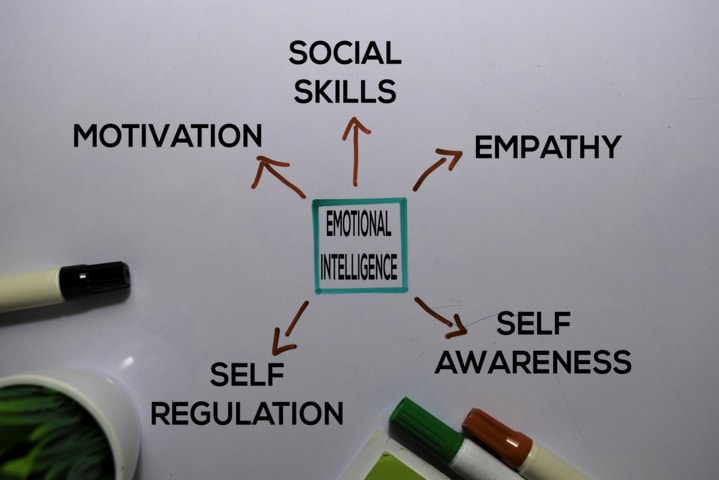Discover the power of emotional intelligence in sales leadership and unlock your team’s potential. Elevate sales success with emotional intelligence (EI).
Sales leadership involves a unique combination of elements: business acumen, technical savvy, and emotional intelligence. While it’s easy to overlook the latter in pursuit of top-line growth and increased market share, recent research suggests emotional intelligence is a valuable soft skill for effective sales leaders.
Those with high levels of emotional IQ possess the ability to comprehend their own emotions as well as those of their team members, allowing them to create meaningful connections and drive individual performance—and amplify success at the organizational level. But what role does emotional intelligence play for sales leaders? Read on to learn more about its importance in mastering sales outcomes!

What Is Emotional Intelligence (EI)?
Emotional Intelligence, or EI for short, is a crucial aspect of our lives that often goes unnoticed. It refers to our ability to perceive, manage, and express emotions in ourselves and others effectively. Unlike IQ, which primarily measures cognitive abilities, EI is a measure of our social and emotional skills. These skills are increasingly recognized as indispensable in modern life.
Whether we’re leading a team, managing our own emotions, or trying to navigate relationships, having a high level of emotional intelligence enables us to connect with others. It allows us to understand their point of view, and respond to situations in a productive and positive way.
While EI is often thought of as an innate ability, it can be learned and developed with practice. So, whether you’re looking to enhance your communication skills or simply improve your own well-being, working on your EI is definitely worth the effort.
How Does EI Impact The Success of Sales Leaders
Emotional intelligence has a significant impact on the success of sales leaders, including:
Builds Strong Relationships With Customers
The ability to understand and manage one’s emotions, provides leaders with the tools necessary to build and maintain strong relationships with customers. For example, by being able to read body language, a sales leader can more easily identify the needs of their customers and respond in an appropriate manner.
Increases Team Morale And Encourages Effective Collaboration
Sales leaders who have high levels of emotional intelligence are better equipped to recognize the moods and feelings of their team members. This allows them to adjust their approach accordingly. This, in turn, can create a more positive and productive working environment. Especially as team members feel supported and respected by their leader.
Leads To Better Conflict Resolution
Having the ability to understand, manage and express emotions is especially important when it comes to conflict resolution within a sales team. Sales leaders with high EI are able to remain calm and analyze the situation objectively, ultimately leading to more effective solutions.
Helps Leaders Adapt To Change
Change is inevitable in any industry, and sales teams are no exception. Having a strong emotional intelligence allows sales leaders to understand how their team members feel about change, as well as identify any potential barriers to adapting. This can help them lead the team through the transition process more smoothly and efficiently.
Strategies To Develop And Strengthen Your EI as a Sales Leader
As a sales leader, emotional intelligence (EI)is a crucial component of your success. In order to build strong relationships with your team, customers, and vendors, it’s important to develop and strengthen your EI skills. This can be accomplished by focusing on skills such as:
- Self-awareness
- Self-regulation
- Motivation
- Empathy
- Social skills.

By honing these skills, you’ll be able to better understand your team, anticipate their needs, and provide the support and guidance they require to succeed. Additionally, developing your EI can help you manage stress, navigate difficult conversations, and build trust and rapport with your colleagues and customers.
Benefits of Incorporating EI Into Your Corporate Culture
In today’s business environment, you’ll find it to be more important than ever to have a strong and empathetic corporate culture. Companies that prioritize emotional intelligence (EI) within their culture are better equipped to manage change and build strong relationships with employees, clients, and customers. By incorporating EI into your corporate culture, starting with your onboarding process, your organization can reap a variety of benefits, including:
Better Communication
Emotional intelligence emphasizes the importance of effective communication, which is a vital aspect of any successful business. Incorporating EI into your corporate culture can improve communication across all levels of the organization. Employees who are emotionally intelligent are better able to express themselves clearly and understand others’ perspectives. This leads to a more collaborative and productive work environment.
Improved Leadership
An organization’s success is highly dependent on the quality of leadership it possesses. When leaders possess high levels of emotional intelligence, they are better equipped to manage and motivate their teams. Leaders with high EI are able to recognize and respond appropriately to the emotions of their team members. They can also communicate effectively, build strong relationships, and inspire their teams to achieve their goals.
Enhanced Teamwork
Teamwork is a critical component of any successful business. When employees possess high levels of emotional intelligence, they are better equipped to collaborate effectively with their colleagues. They can recognize and understand different perspectives, which leads to better decision-making and more innovative solutions. Teams with high levels of EI also tend to be more supportive. This leads to increased job satisfaction and higher retention rates.
Increased Empathy
Empathy is an essential aspect of emotional intelligence. When employees possess high levels of empathy, they are better able to relate to their colleagues, clients, and customers. This leads to stronger relationships and more positive interactions. Companies that prioritize empathy within their culture are better equipped to build lasting relationships with their customers and improve brand loyalty.
Improved Customer Service
Customer service is a critical aspect of any business. Companies that prioritize emotional intelligence within their culture are better equipped to provide excellent customer service. Employees with high levels of EI are better able to understand the needs and emotions of their customers. This leads to more positive interactions. This helps to build brand loyalty and can lead to increased sales and revenue.
Increased Resilience
Change is a constant in today’s business environment, and companies that are resilient are better equipped to manage change effectively. When employees possess high levels of emotional intelligence, they are better equipped to manage stress and adapt to change. They can also bounce back from setbacks more quickly. This helps to minimize the impact of any disruptions to the business.
Top Companies Leverage EI to Improve Their Sales Leadership
Emotional intelligence is not just a trend but also an essential skill for modern sales leaders. Companies that are leveraging EI in their corporate culture are seeing increased sales, higher employee engagement, and better customer relations. Here are a few examples of how leading companies are using EI to improve their sales leadership and better equip their teams with the tools they need to succeed:
• Microsoft – Microsoft has developed a series of workshops that focus on teaching emotion regulation and mindfulness. The goal is to teach employees how to be more in tune with their emotions so they can recognize when they are feeling overwhelmed or frustrated, ultimately leading to better decision-making.
• Amazon – Amazon has implemented a program called ‘Lead with Emotional Intelligence,’ which helps sales teams develop their emotional intelligence and learn how to effectively express their feelings in order to build stronger relationships and be more effective communicators.
• Salesforce – Salesforce is using EI to create more effective sales teams. The company has developed a suite of tools that help sales managers identify the areas their team needs to work on in order to be successful, such as recognizing emotions and responding appropriately.

How to Measure the Effectiveness of Your EI Strategy in Your Organization
As the concept of emotional intelligence (EI) continues to gain traction in the modern workplace, businesses are looking to improve their employees’ EI skills. Many organizations have started implementing various strategies to develop these skills, such as offering training programs and workshops. However, simply implementing an EI strategy is only the first step towards achieving success in this area. The other half is measuring its effectiveness.
This can be a daunting task, but it is essential to ensure that your organization’s investment in EI is paying off. Luckily, there are various ways to measure the impact of your EI strategy, including:
- Employee Surveys: Employee surveys are one of the most effective ways to measure EI on your sales team. Surveys can help you identify areas where employees need additional training or support and track progress over time.
- Performance Evaluations: Performance evaluations are another great way to measure the effectiveness of your EI strategy. By regularly assessing the performance of your employees, you can see which areas require additional development and recognize success.
- Customer Satisfaction: Customer satisfaction is an important metric when assessing the success of your EI strategy. If customers are more satisfied, this could be a sign that employees are better equipped to recognize and respond to their emotions in a positive way.
By regularly measuring and analyzing data, you can gain valuable insights into how your EI strategy is impacting your organization and make any necessary adjustments to ensure its success.
Wrapping It Up
Emotional intelligence is a powerful tool that sales leaders can use to improve their performance, maximize sales, and empower their teams. Having an understanding of what Emotional Intelligence is and the impact it has on business success gives sales leaders the confidence and knowledge to develop effective strategies for incorporating EI in their corporate culture.
If you’re looking to hire emotionally intelligent salespeople to add to your team, you’ll want to become a client with Sales Recruiters Dallas. You can also contact us today to learn more about how we can help you find the top sales talent in Dallas. Our sales recruiters specialize in sales jobs in Dallas to provide the perfect fit for your team and organization.

